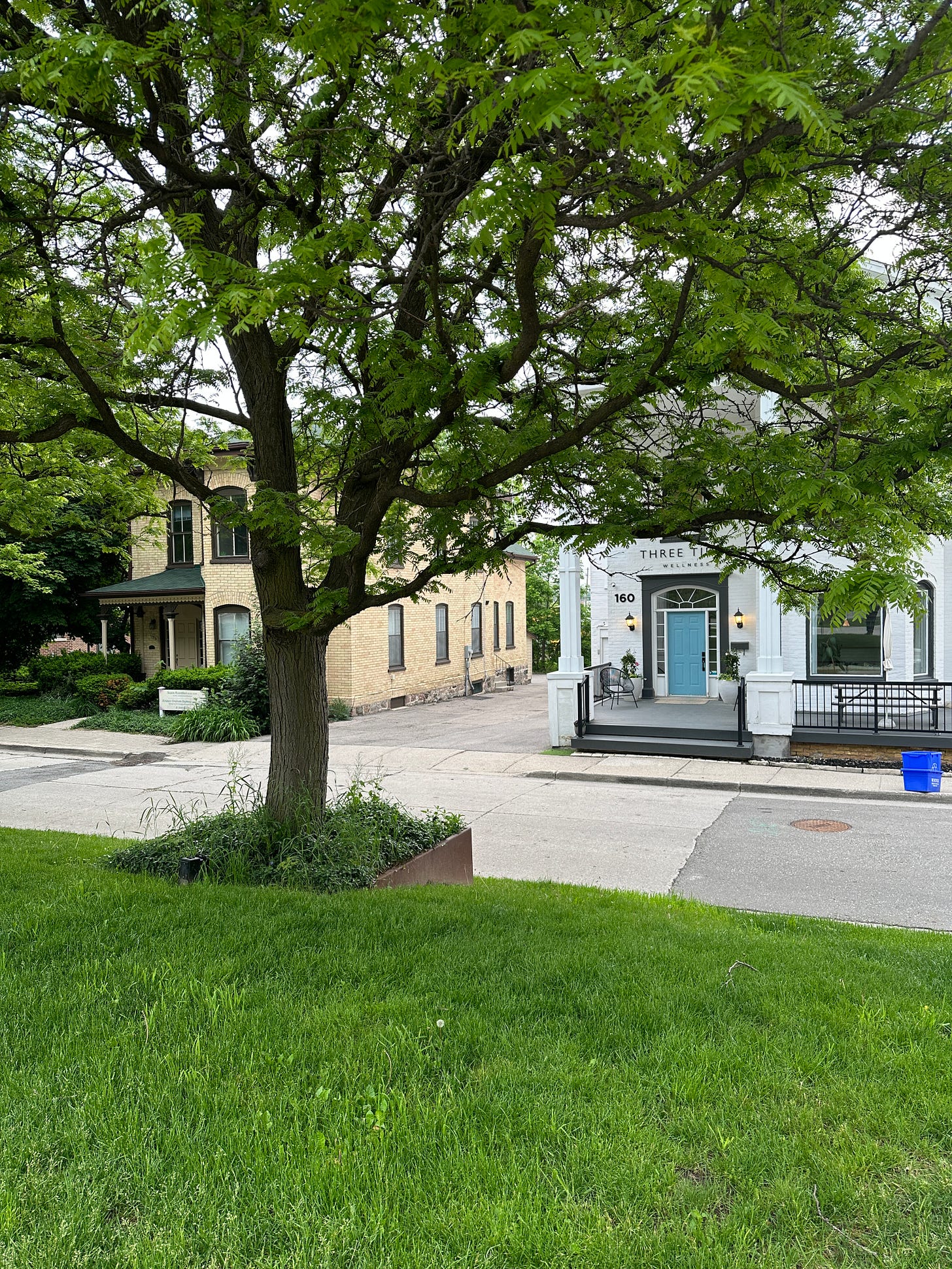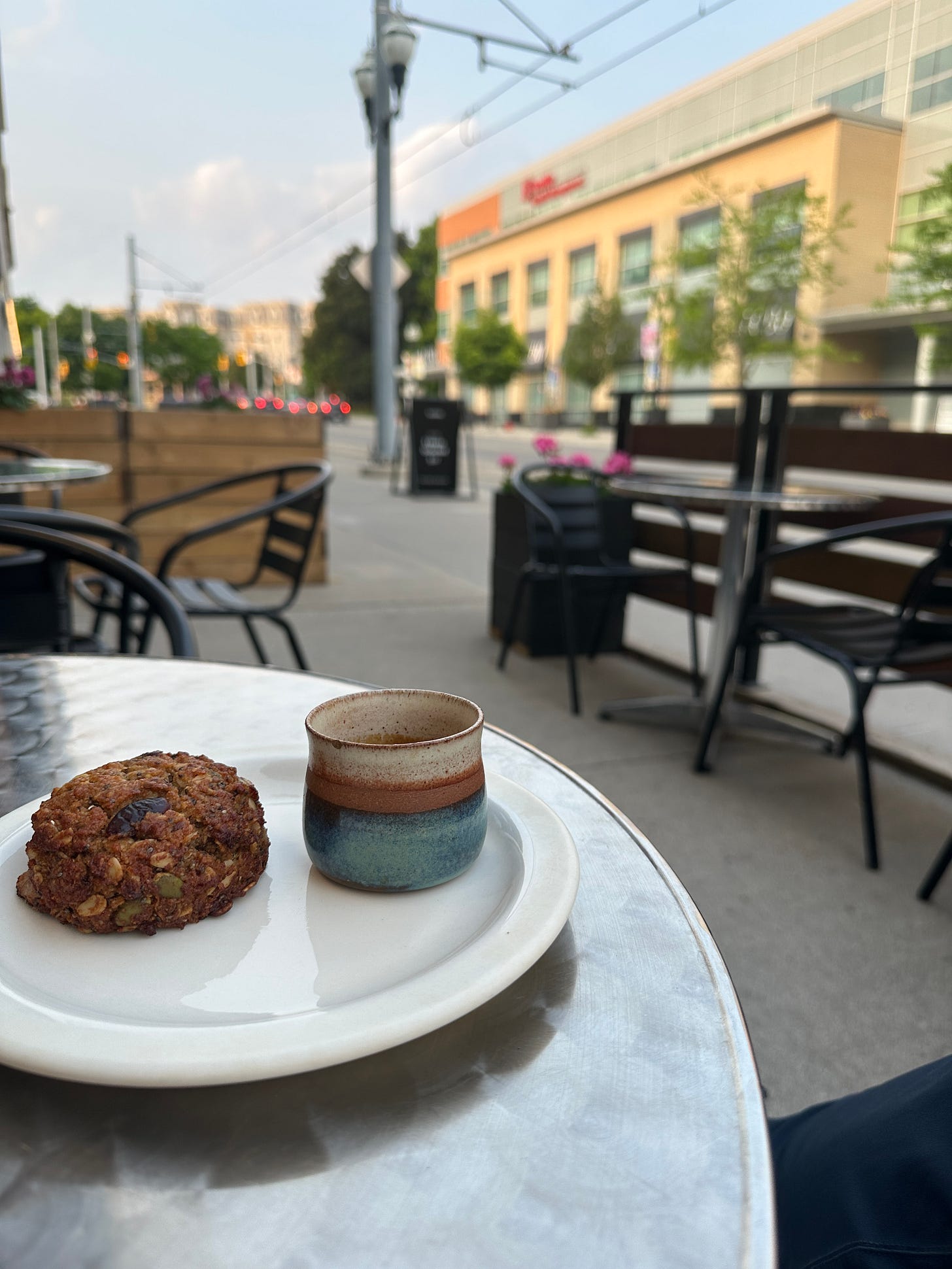Scooting, Riding, and Walking in Waterloo
How stuff moves
Last week I returned to my second institutional home - the University of Waterloo. I know it more each time. Getting around Waterloo itself is absurdly easy. Light rail criss-crosses walking, biking, and riding paths. Parks abound. So much green.
Naturally, that gets everyone who is able out and about (even those who are not are welcomed by the wheelchair symbology on the signs that line the paved active transit routes). I spend my mornings walking several easy, mild kilometres to a coffeehouse that opens at the delightful urban hour of 7:00am (it’s 8:00am at my local - 7:30 in the summer). I’m not alone at the open, which makes the sunrise situation even more delightful. The good people of Waterloo are no strangers to active transportation in the morning hours.
As is known to happen - my fellow patrons ask me about the small, custom espresso mug that I carry with me at all times (what my wife affectionately calls my ‘pocket pottery’). A particularly curious couple asks if the makers ship across the country - the answer is yes, by the way.
How easy it is to get around Waterloo was, in fact, the very first thing I noticed about the town when I first arrived in early 2024. I have the paying-attention-at-all times disease and that has served me in different ways throughout my life. As an adult, mostly well - I can see how things work (generally speaking) and can build relationships and navigate through it. As a child, it served me terribly. I paid far too much attention. I saw everything there was to see - even if people didn’t know it. The problem being that I had no idea what to do with it all because I didn’t have the emotional maturity to process it in a useful way.
The noticing and the attenioning still happens for me every day, all the time, but now it’s an absolute joy. It affords me the great luxury of feeling at home almost anywhere. (If you think that’s not possible because you’re nursing an addiction to mainstream media, I urge you to turn it off and walk out your front door).
“Some poor, phoneless fool is probably sitting somewhere next to a waterfall totally unaware of how angry and scared he’s supposed to be.” - Duncan Trussell
In Waterloo, it led me to noticing how things move around. Unlike during COVID - when how stuff moved temporarily broke - things here move well. They move very well. And it doesn’t escape me how that increases access to opportunities of all kinds - economic kinds, social kinds, political kinds, all kinds. It’s as much as a full third of the foundation of economic development.

The realization landed for me the way it did because I was thinking about it’s contrast to my own home, on the far-East coast of Canada. It’s a place where stuff moves pretty well (ports, rail, road) but where people do not (only by car and barely by plane). We live far away from each other - generally speaking - so it takes a lot of energy to get things place to place (800,000 people across 73,000 square kms). We work in the urban core and then commute away from it to return to our homes or to do our shopping. Public transit doesn’t work all that well and the airport is in an absurd state.
But not here! Not in Waterloo.
Let’s talk briefly (today, some respite from my 3,000 word average) about how stuff moves and why that matters.
“…the intoxicating feeling of passing through the ticket gates knowing the rails can take you anywhere you wish, in a known quantity of time, all while leisurely soaking in everything in between.” - Sam Holden
All we need is a point of view, a set of tools, and a lot of time. I hope that in this brief field note you simply enjoy yourself.
Scoot Scoot Micro-Climate
This particular transportation epiphany (I’ve had several) came while on an electric Neuron scooter. They’re everywhere in Waterloo - neon orange. Not to be confused with a Bird or a Lime that are strewn about the streets of Santa Monica or Orlando.
My friend and colleague Daniel and I hopped aboard these two-wheeled teleportation devices and headed for campus - saving no less than 15 minutes in the doing. That doesn’t sound like much, but it also isn’t not much. It’s a completely viable “last mile” option. You scan to ride, you’re charged by the minute, and then you deposit yourself and your scooter wherever you need to (within reason) - taking a quick photo of your park-job to end the ride. Payment is made, naturally, via Apple Pay. It works perfectly.
Unlike the average human on a commute, those on the bright orange scooters are often smiling. Smiling! On a commute! Compare this delightful scenario to those stuck in traffic on the Torontonian 401 or the Californian 405 and you now have a contrast that puts the contrasted two on entirely different planets. Having entirely different experiences of life and motion. What might happen if we all lived closer to one another and rode our scooters or bikes or feet instead of 4 wheels, a chassis, and a combustion engine? It might look something like the towns of Denmark or the Netherlands, as opposed to the freeways of America.
In Waterloo it looks like scooters - in Tokyo (and now many other places) it often looks like electric bikes.
Craig Mod called the e-bike the… ‘Stupid love of my life.’ Here’s how he opened the wonderful piece (Craig has a hit ratio that few will ever even circumnavigate let alone achieve). Impossibly good.
The story of Craig’s love affair with his e-bike (and his feet) is the story of how stuff moves. COVID reminded us all that stuff is finite and stuff has to be made and moved around the world for us all to be afforded the luxuries that most of the world has become accustomed to.
“Summers in Japan have never been easy…Crushing heat coupled with suffocating humidity…In Japan’s August, you simply can’t walk a block without losing most of your moisture…Bikes have always helped. A bicycle generates a microclimate with minimal effort.” - Mod
Craig moves in Japan by way of bike, but many (most?) in Japan move by rail - another absolutely delightful way to move about the world. My dear wife and I love riding rail. Specifically, the New England corridor that has become sacred to us. First, a night at the Harraseeket. In the morning, a short commute to the Portland transit station, and a return ticket on the Downeaster, into North Station, Boston. When the moment moves us, a walk to South Station to board the Acela, enroute to Penn, in the heart of Manhattan.
I want to travel by train all the time, trying all the routes there are to try. Unlike modern airplane travel, it’s comfortable, it’s calm, and it’s on time. It might sound absurd but my desire to ride the Bright Line in Florida is reaching a fever pitch.
“Railroads mean many things to many people.” - Holden
Sam Holden writes about how stuff moves on Substack and I reached out to him personally to congratulate him on a piece called “Trains from the past, trains to the future,” set in, you guessed it, Tokyo.
Sam points out that rail in Japan has been a pet obsession of elected officials since 1933, when the last mainline railway was finished in the San’in region - and it still is.
“Like railways everywhere, it’s arrival brought with it the transformations of modernity: national standardized time, national identity, and the national space of an integrated market.” - Holden
Rightfully so, it has transformed the Japanese nation - it made very productive people all the more productive. Leo Lewis from the Financial Times wrote that… ‘The Shinkansen…is the closest we will ever come to a teleportation machine.”
That’s exactly how I feel about my inland-Canadian home of Waterloo, Ontario. Moving around is easy. Energy abounds. Criss-crossing the community to go out and do stuff, and make stuff, and sell stuff, and see stuff, and to be together.
“…a love of trains not for remarkable velocity or urban complexity, but foremost for how a rail network stitches together the nation into a contiguous spatial and temporal quilt…” - Holden
We can’t underrate how important transportation is to social and economic opportunity.
All we need is a point of view, a set of tools, and a lot of time.
See you on the road (or rail).
“And so I feed that impulse, an impulse generated and nurtured by the electric bike.” - Craig Mod






